Post-Doctoral Fellow Receives Grant from NASA to Improve Environmental Justice in Metro Atlanta

Yun Hang, PhD, a post-doctoral fellow in the Gangarosa Department of Environmental Health, was recently awarded a one-year grant byNASA’s Applied Sciences program to assess the feasibility of using NASA Earth Observations to support science education and decision-making in Metro Atlanta’s environmental justice communities. Hang was the only post-doc to have received the grant as a principal investigator—a rare occurrence for NASA grants.
Hang studies the intersection of atmospheric science and public health with remote sensing techniques and machine learning algorithms. She has previously been funded by NASA and National Institutes of Health to apply satellite data in air quality modeling and assess the health impact of climate change exposures.
This grant extends her research to:
- Assess major environmental risk factors faced by environmental justice and underserved communities with satellite data, ground measurements, and machine learning techniques
- Enhance community stakeholders’ knowledge on the health effects of environmental exposures and build their awareness of NASA Earth Observations
- Support local community decision-making toward achieving environmental justice with the help of high-resolution data products and education materials.
In Atlanta, many communities face serious environmental justice issues—such as having higher levels of exposure to extreme heat, air pollution, and the lack of green space. Race has been reported as a strong determinant of exposure to ambient air pollution and extreme heat that are established risk factors for adverse health outcomes including cancer, heat stroke, cardiovascular and respiratory diseases, and premature death.
Historically, public health agencies have relied on ground monitors and weather stations to estimate population-level exposures to inform public health recommendations. However, the lack of ground monitoring sites in many of the communities most deeply impacted by environmental justice issues presents a challenge for decision-makers to assess the true health burdens of associated exposures.
Hang plans on using satellite observations to extend ground monitoring networks to produce full-coverage exposure estimates in Atlanta that provide the required information to advance progress in environmental justice. Community partners on the project include Atlanta environmental justice community leaders dedicated to advancing the resilience of under-resourced communities and neighborhoods.


